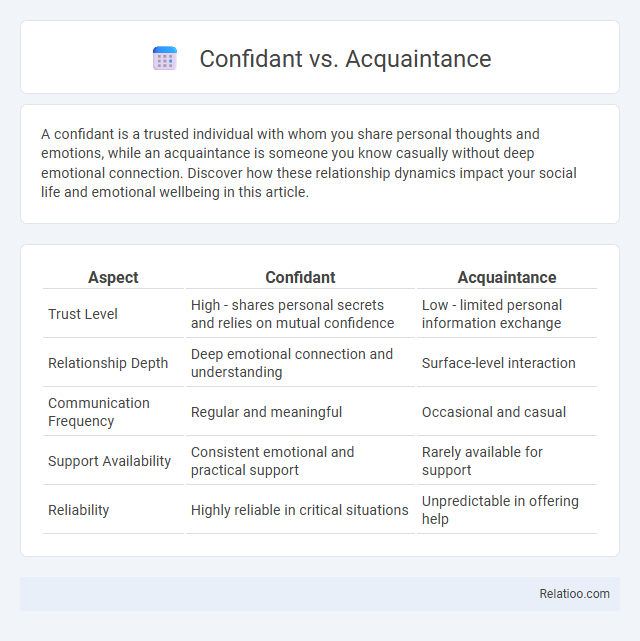A confidant is a trusted individual with whom you share personal thoughts and emotions, while an acquaintance is someone you know casually without deep emotional connection. Discover how these relationship dynamics impact your social life and emotional wellbeing in this article.
Table of Comparison
| Aspect | Confidant | Acquaintance |
|---|---|---|
| Trust Level | High - shares personal secrets and relies on mutual confidence | Low - limited personal information exchange |
| Relationship Depth | Deep emotional connection and understanding | Surface-level interaction |
| Communication Frequency | Regular and meaningful | Occasional and casual |
| Support Availability | Consistent emotional and practical support | Rarely available for support |
| Reliability | Highly reliable in critical situations | Unpredictable in offering help |
Understanding the Terms: Confidant vs Acquaintance
A confidant is someone you trust deeply with personal secrets and sensitive information, while an acquaintance is a person you know casually without a close emotional connection. Understanding the terms, your relationship with a confidant involves mutual trust and emotional support, whereas an acquaintance typically lacks this level of intimacy. Recognizing these differences helps you navigate social boundaries effectively and foster meaningful connections.
Key Characteristics of a Confidant
A confidant is a trusted individual who offers emotional support, maintains your secrets, and provides honest feedback, distinguishing them significantly from an acquaintance who shares only casual, surface-level interactions. Unlike general acquaintances, a confidant is someone with whom you share intimate thoughts and feelings, creating a deeper bond based on trust and understanding. Your relationship with a confidant plays a crucial role in fostering emotional well-being and personal growth.
Defining Traits of an Acquaintance
An acquaintance is characterized by a limited, casual relationship typically based on occasional interactions or shared environments, lacking deep emotional connection or trust. Unlike a confidant, an acquaintance does not serve as a reliable source for personal secrets or emotional support due to the superficial nature of the bond. The defining traits of an acquaintance include familiarity without intimacy, infrequent communication, and minimal personal disclosure.
Depth of Connection: Emotional Intimacy
A confidant is characterized by a high level of emotional intimacy, where trust and sharing of personal thoughts create a deep bond. An acquaintance has a shallow connection, primarily based on casual or surface-level interactions without significant emotional exchange. The depth of connection with a confidant fosters vulnerability and support, distinguishing this relationship from the more distant and less emotionally involved nature of acquaintances.
Trust Levels: Sharing Secrets and Vulnerabilities
Confidants represent the highest trust level, as individuals openly share secrets and vulnerabilities, fostering deep emotional bonds and mutual understanding. Acquaintances maintain a low trust level, typically engaging in surface-level conversations without revealing personal or sensitive information. Friends occupy a middle ground, where selective sharing occurs based on established trust, allowing for moderate emotional intimacy without full disclosure.
Frequency and Quality of Interactions
Confidants engage in frequent and deep interactions, building trust that allows you to share personal thoughts and emotions, whereas acquaintances have sporadic and surface-level contact, limiting emotional connection. The quality of interactions with confidants is characterized by empathy and mutual support, while interactions with acquaintances typically revolve around casual or situational conversations. Understanding these distinctions helps prioritize relationships that contribute significantly to your emotional well-being.
Role in Personal and Social Life
A confidant plays a crucial role in your personal and social life by providing trust, emotional support, and a safe space for sharing intimate thoughts or feelings, unlike an acquaintance who holds a limited social role, primarily through casual or surface-level interactions. While acquaintances expand your social network and offer diverse perspectives, confidants contribute to deeper emotional well-being and resilience through loyalty and understanding. The distinction lies in the quality and depth of connection, where a confidant fosters meaningful bonds essential for personal growth and social stability.
How to Identify Your Confidants and Acquaintances
Confidants are trusted individuals with whom you share personal, sensitive information, characterized by deep emotional connection and mutual support, whereas acquaintances are people you know in passing or through casual interaction without significant emotional disclosure. Identifying confidants involves evaluating the level of trust, reliability, and confidentiality demonstrated over time, while acquaintances are typically recognized by their limited interaction scope and lack of intimate communication. Assessing the frequency and depth of conversations alongside mutual responsiveness helps differentiate between these relationship types.
Navigating Boundaries Between Confidants and Acquaintances
Navigating boundaries between confidants and acquaintances requires recognizing the depth of trust and emotional intimacy involved. Your confidants are individuals with whom you share personal thoughts and feelings, while acquaintances maintain a more surface-level connection with limited disclosure. Setting clear boundaries helps protect your privacy and fosters healthy relationships by distinguishing between those who deserve confidentiality and those who do not.
Building Stronger Relationships: From Acquaintance to Confidant
Building stronger relationships involves shifting from the casual nature of an acquaintance, characterized by limited interaction and surface-level knowledge, to a confidant, where trust and emotional depth foster open communication and support. Developing shared experiences, consistent empathy, and reliable confidentiality transforms these connections, enabling deeper understanding and mutual respect. Prioritizing genuine engagement and vulnerability accelerates this progression, solidifying bonds that form the foundation of meaningful interpersonal relationships.

Infographic: Confidant vs Acquaintance
 relatioo.com
relatioo.com